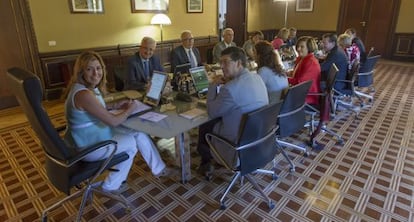Fallout from squatter crisis prompts more talk of early elections in Andalusia
Opposition conservatives may benefit from sense of “leftist chaos” in region Relationship between Socialists and United Left comes under increasing strain


The shadow of early elections is looming ever larger over the coalition government in the southern region of Andalusia, following a week-long crisis over squatter families who were given public housing.
Regional premier Susana Díaz, of the majority Socialists, who has only been in power since September of last year following the resignation of her predecessor, José Antonio Griñán, has already admitted that she has considered the possibility.
“If legality had not been re-established, I wouldn’t have ruled it out,” Díaz said in a radio interview with the SER network.
She was referring to the internal crisis that was sparked on Wednesday of last week, when the Socialists’ coalition partner United Left (UI), which is in charge of the public works and housing department, began handing out keys to subsidized homes to squatter families who were camping out in front of Seville City Hall in protest over their recent eviction from a bank-owned property.
The Socialists said that IU could not unilaterally bypass official waiting lists for public housing, as this sent the message that anyone can get a home by “banging on the door.” In a show of strength, Díaz used a decree to take away IU’s power to award housing, then returned it a day later. Since then, both sides have been working together to try to smooth out their differences.
Both sides admit the leftist alliance “will not withstand” another similar situation
Still, what last week still looked like a remote possibility — early elections— does not seem so unlikely anymore. “The way things stand right now, that possibility is open,” said sources in the Andalusian executive. Until now, leaders from both political groups had vehemently denied that they might call voters to the polls before the end of the term, in March 2016.
Despite public statements about the coalition coming out stronger from this crisis, in private sources from both sides admitted that the leftist alliance “would not withstand” another similar situation.
Now, many observers feel that the crisis will benefit the conservative Popular Party (PP), which is already in power in many of Spain’s regions. With regional elections scheduled for May 2015, “the message that’s being sent out is that this formula does not work and that the PP offers stability, compared with the chaos of the left,” said one political leader. Andalusia has been ruled by the Socialist Party since 1982; in the last elections of March 2012, for the first time the PP secured more seats in the regional parliament, forcing the Socialists to enter into a coalition with IU, itself a grouping of communist and environmentalist parties, to hold onto control of the region.
In the meantime, the Andalusian branch of the PP has asked for the regional parliament to convene for an emergency session so that Díaz can explain the crisis and, as the conservative party argues, explain “why it is letting IU misrule in Andalusia.”







































